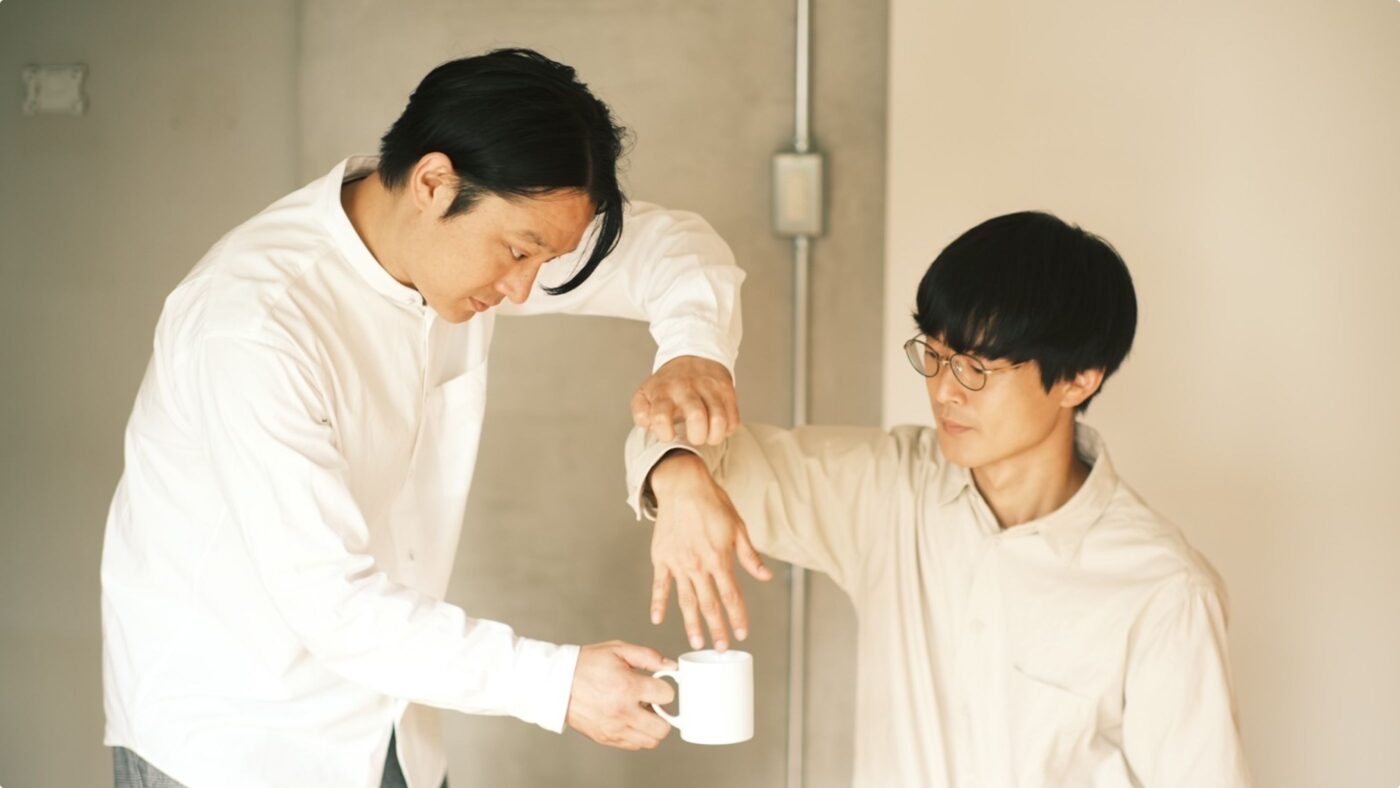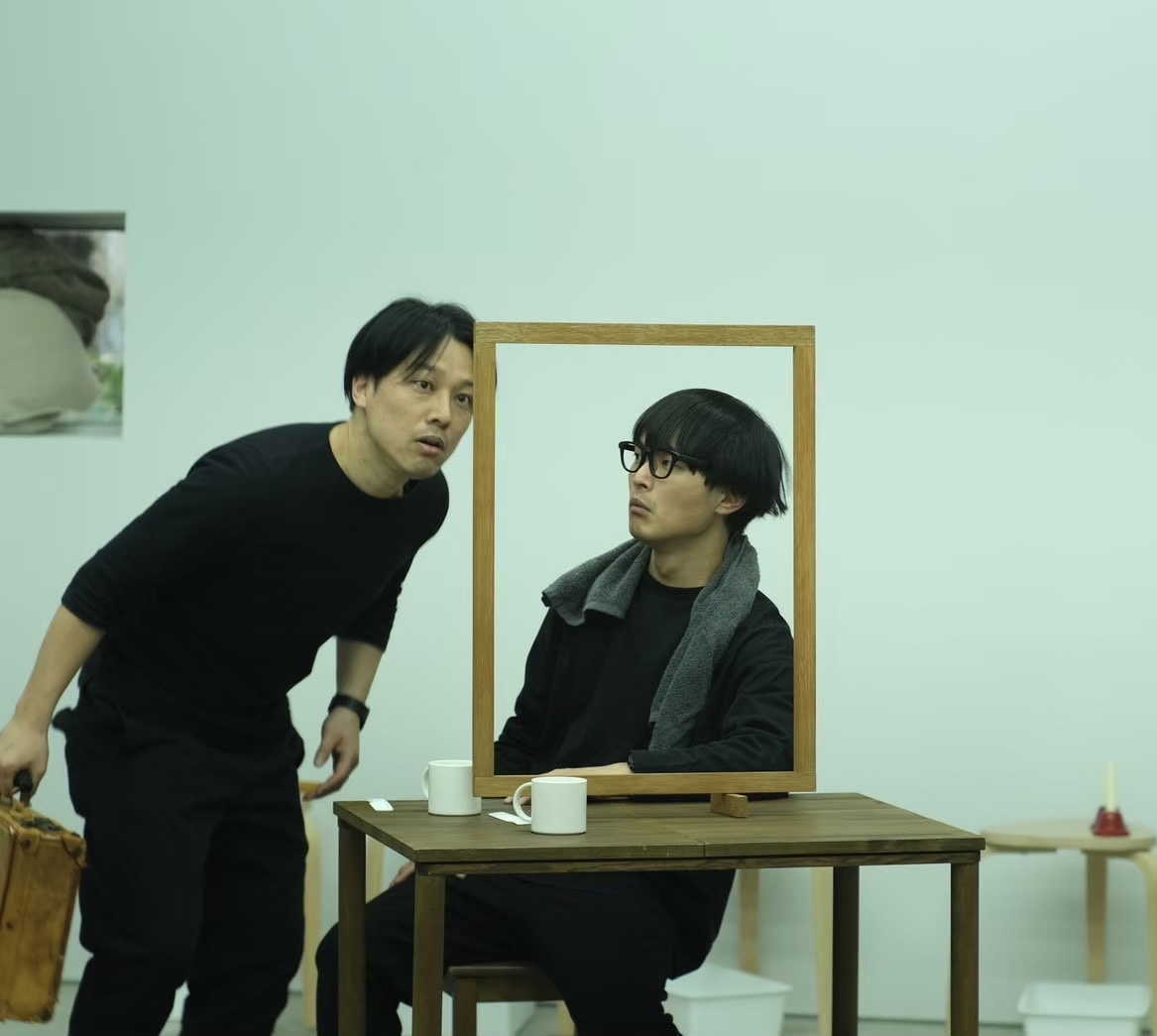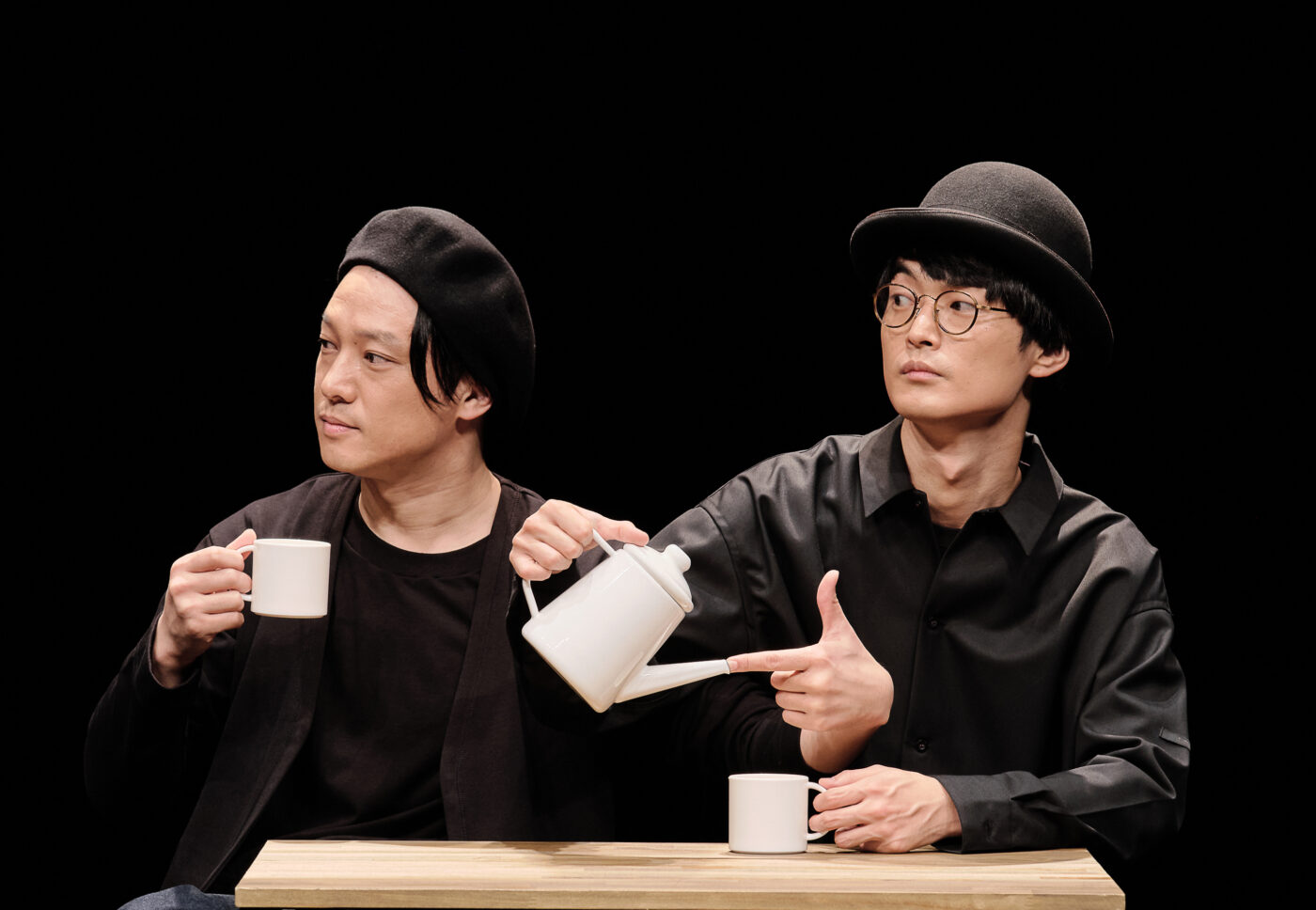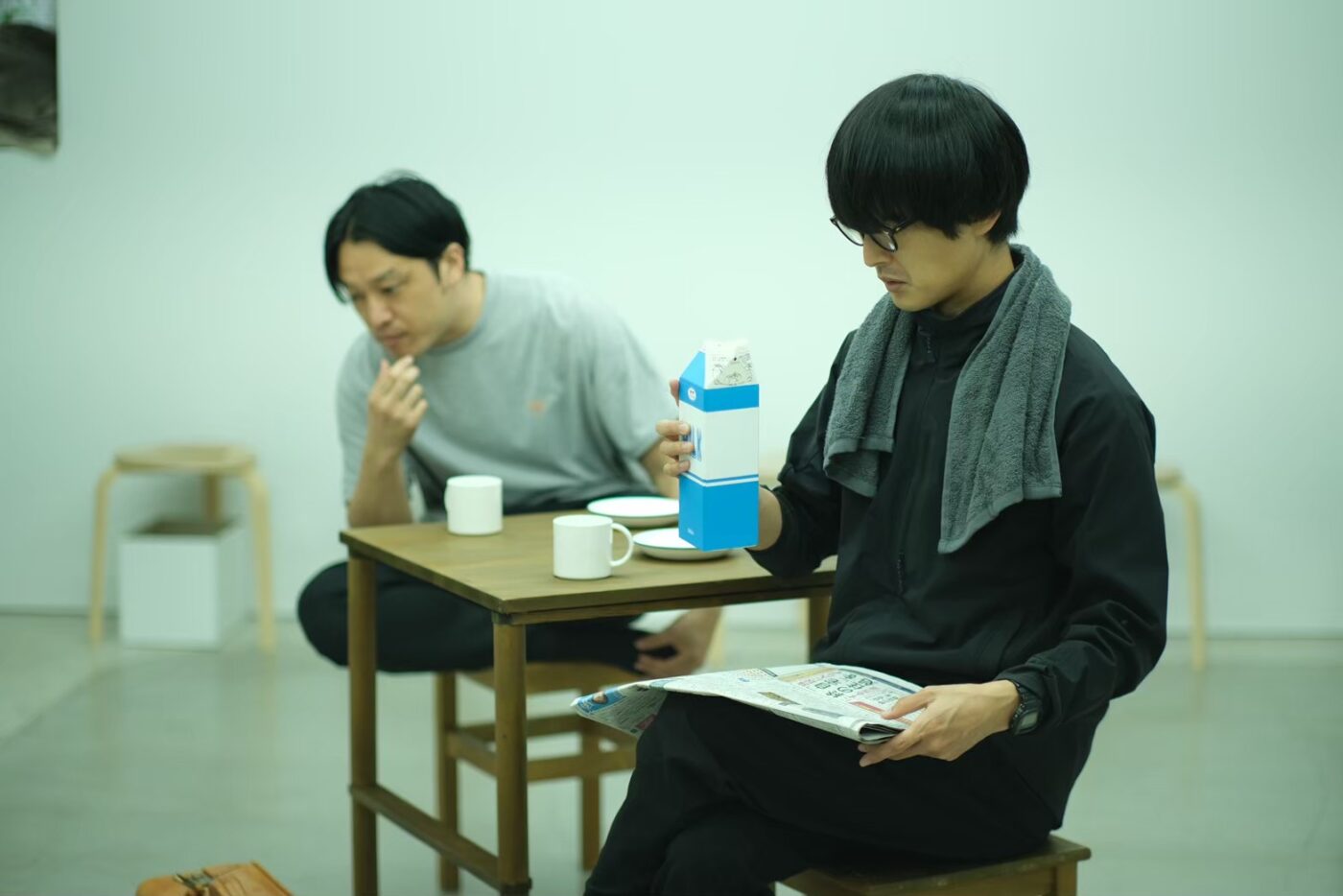Interview:
Inside Japan Selection
cube inc. — ZEROKO MONONOME re-creation version

From the Streets of Japan to the World —Warry Kinoshita and Zeroko take on the frontlines of immersive, non-verbal comedy
There is a pair of performers who have developed mime and expression—which originated in Europe—in a uniquely understated way, far from flashy humour. They are the physical comedy duo Zeroko, whom director Warry Kinoshita has taken a keen interest in. For this year’s SOIL programme, despite belonging to different generations, Kinoshita and Zeroko share a commitment to non-verbal performance, and together they are set to re-create Zeroko’s signature piece, Mononome.
No need for overacting—Zeroko's charm lies in "the humour of ambient tension"

Zeroko is a physical comedy unit formed in 2016. Using techniques from mime and clowning as their base, Masashi Kadoya and Keisuke Hamaguchi create wordless works that cut out slices of everyday life with a playful spirit.
Their performances are free from exaggerated gestures or over-the-top acting. Instead, they evoke what is seen and felt through subtle glances, breath, and minimal movement. This ability to vividly conjure create the intended atmosphere is what draws audiences in, eliciting a quiet yet intimate laughter—the very essence of Zeroko’s appeal, according to Kinoshita.
Their first encounter was in 2018, when Kinoshita was working as a performing arts programme director at Kobe Art Village Centre (KAVC, now Shinkaichi Art Centre). There, he launched an the cross-genre open call project, “KAVC Art Jack 2018”, which made every corner of the venue—not just theatres and galleries—available for presenting artistic work. Zeroko applied and were selectedwere among the entries.
Kinoshita himself has long pursued non-verbal theatre. From directing the opening ceremony of the Tokyo 2020 Paralympics to writing and directing the 2.5D stage series Haikyu!!, he has recently flourished in large-scale productions. Yet his roots lie in fringe theatre, and during his thirties he vigorously pursued independent work abroad. His non-verbal troupe, THE ORIGINAL TEMPO, earned five-star reviews at the Edinburgh Festival Fringe in 2008 and 2009.
Now, Kinoshita’s decision to support Zeroko’s leap to the international stage comes from a deep empathy and hope for emerging creative forces.
Audience members become objects—participation and complicity in Mononome
Mononome, a staple in Zeroko’s repertoire, premiered in 2018 at KAVC Art Jack and was later revived in Tokyo alternative venues in 2022 , 2023 and 2024. Now, with Kinoshita newly joining as co-director, the piece enters a fresh phase of re-creation. This version is centred on the technique of “objectification”—presenting humans as things. While Japanese culture has long embraced “personification” (representing objects as human), this work boldly flips that notion, disrupting anthropocentric perspectives.
In the piece, two performers comically enact scenes from daily domestic life. Initially observers, audience members gradually receive props and are incorporated into the scene as part of the environment—a fridge, a shower, or furniture. The title Mononome plays on the Japanese words for “the eyes of things” and mononoke (spirits), evoking a non-human presence or perspective. Audience members embody these “things” and experience the world of the play through their eyes.
The show’s simple and intuitive structure—accessible to everyone from 0 to 99 years old—is one of its strengths. Yet beneath its simplicity lies depth. Originally a showcase for Zeroko’s clownish characters, this recreation introduces fictional layers: who these characters are, what sort of morning they are waking to. Kinoshita plans to subtly draw audiences into the story, not only having them participate, but making them question why they have been assigned a role as an “object”—and to feel the necessity, joy, and at times, the unease of that role. By expanding musical elements and scaling up the direction, the team aims to retain the work’s delicacy and intimacy while ensuring it can adapt to theatres, open spaces, cafes, and outdoor venues alike.
By re-examining human-object relationships, Mononome could bring fresh energy to the field of object theatre. As a producer who has supported Zeroko from the sidelines, and a director versed in both fringe and large-scale entertainment, Kinoshita is uniquely placed to realise and expand its potential.
Toward international co-productions

Zeroko has previously appeared abroad, including winning the Best Comedy Award at the Asian Arts Awards at the Edinburgh Festival Fringe in 2019, and have remained active across Europe and Asia. But for Kinoshita, launching Mononome overseas is not the sole goal. Rather, it is to meet other artists and presenters, build relationships, and forge new collaborations born from these encounters.
This vision is rooted in Kinoshita’s own international co-production experience. Having collaborated in Slovenia, Korea, and Germany, and other countries, he says, “Many of them didn’t go as planned, but it was precisely those experiences that became the most valuable lessons. To really understand communication, you need to experience being backed into a corner outside the familiar context. It was a huge learning curve in my theatrical life.”
“International co-productions taught me not to seek only ‘successful’ or ‘pleasing’ outcomes. The danger of prioritising results is that you may neglect the people involved. Since theatre is a collective creation, the people always come first.” Even now, as he helms major commercial and entertainment productions in Japan, this belief remains his compass.
Expression born only outdoors—street theatre's present and potential
Kinoshita is passionate about creating opportunities for different cultural contexts to face each other directly—linking theatres and festivals across countries to enable joint creation.
Alongside his own directing work, he founded one of Japan’s largest short play festivals, “PLAY PARK”, and the outdoor performance event “Tama 1-Kilometre Festival”. Since 2016, he has also directed “Strange Seed Shizuoka”, a street theatre festival. He continues to support and produce work with young, Japan-based artists, especially focusing on street theatre’s potential.
“In Japan, street theatre has long been seen as a way to promote indoor shows, but after ten years of steady practice in Shizuoka, that shift in perception has clearly grown out of the work itself. Now it’s seen as a space for what can’t be done indoors. Works are emerging that can only happen outside. Artists are embracing the unpredictability, stepping away from the safety of theatres, and finding joy in imagining and creating in freer spaces. I believe the next decade will bring surprising new expressions and inventions.”
Using everyday scenery as stage, street theatre resonates deeply with younger generations attuned to immersive and experiential work. From 2025, Strange Seed Shizuoka will launch the Agency for Cultural Affairs-funded project “STRANGE Lab.” to foster global street theatre talent. Over several years, it will support five artist groups, including Zeroko, through creation and international collaboration.
The imaginative distance of dislocation

Though based in Japan, Kinoshita is cautious about presenting anything overtly “Japanese”. “The mere fact that we’re a Japanese company often makes people view us through a Japanese lens. So instead of conforming to stereotypes or expectations, we try to step back and let audiences imagine freely.”
This approach—using distance to expand imagination—reflects Kinoshita’s ongoing inquiry into how to meet audiences. While drawing on popular and entertainment forms, he never panders. He pursues bold expression with a critical edge. Zeroko’s signature “space for imagination” resonates strongly with this stance.
The Mononome recreation, driven by Zeroko and Warry Kinoshita, is more than a work being exported. It’s a door to encounters, dialogue, and new creation. Their journey is just beginning—and it starts here, at SOIL.
Original Text by Yurika Kuremiya
Translated by SOIL Team
